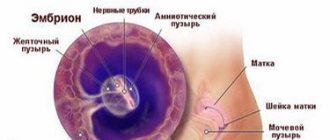General information
The phenomenon of the maternal sphere (including the semantic experience of pregnancy) is determined by the specifics of experiencing the symptoms of pregnancy and plays a significant role in the external activity and mental state of a pregnant woman.
During this period, women react emotionally to all their sensations and any changes in the fetus. This is largely due to the restructuring of a woman’s self-awareness, which already includes the image of the unborn child as a separate human entity (the stage of accepting a new life within oneself). Most often, this stage during pregnancy occurs during the period when the fetus begins to move (week 16-18) and the mother herself begins to interpret its behavior: “woke up,” “worried,” “playing,” etc. As the fetus develops (33 weeks - 35 weeks), many women begin to worry about the fetus hiccupping in the stomach. Less commonly, hiccups are observed in the fetus during early pregnancy (from 24-25 weeks). The child hiccups especially often during the 32nd week of pregnancy, and also, according to surveys of pregnant women, often hiccups at the 37th week of pregnancy. It is impossible to clearly define the timing of the appearance of hiccups in the fetus, but most often this phenomenon occurs at the end of the second trimester, although most women begin to feel it later (in the third trimester). The same phenomena include fetal yawning, which occurs in earlier stages of pregnancy.
However, many pregnant women do not feel the “hiccup phenomenon” of the fetus in the stomach during pregnancy and often worry about this, and some women even doubt whether a child can hiccup in the womb? As studies show, this is due to the fact that a pregnant woman does not feel all the movements of the fetus, and many of them simply have a low sensitivity threshold and do not feel hiccups.
Sometimes pregnant women are not concerned about the fact of hiccups themselves, but why the baby in the stomach often hiccups or hiccups every day or constantly for 20-30 minutes 2-3 times a day, since many people associate this process with pathology. Women with an anxious type of pregnancy experience are especially worried, in whom the behavior of the fetus (moving, hiccups, yawning) is accompanied by anxiety, doubts and even fear.
How does hiccups manifest?
First of all, it must be said that hiccups are an unconditioned reflex caused by contraction of the diaphragmatic septum. Hiccups in the fetus manifest themselves individually: its duration can vary from 2-3 minutes to half an hour. The frequency of its occurrence also varies: for some – several times a day, for others – once a week. Accordingly, pregnant women have different emotions in relation to this phenomenon: some are worried, others are happy, and many are worried: is it dangerous and is help needed or not? We should also not forget that a pregnant woman’s feelings about the behavior of the fetus are quite subjective and there is no need to compare them with the feelings of other pregnant women and attach extreme importance to them.
Today, scientists believe that despite the uncertainty of the origin of such phenomena, the ability of a developing fetus to hiccup, swallow, yawn, and stretch is one of the factors (indicators) of physiologically normal intrauterine development and indicates its achievement of a certain level of psychophysical development. It has been proven that this is normal and is not a risk factor for fetal development, and the child does not experience any discomfort during the hiccup period.
Why does the baby hiccup?
In those days when there were no informative diagnostic tools (such as, for example, ultrasound), obstetricians perceived fetal hiccups as a good sign. This indirectly indicated that in the first trimester the embryo was formed correctly: in any case, it has a mouth, pharynx, esophagus and diaphragm. And the innervation also works as expected. Today, experts do not have a single concept about the causes of hiccups. There are three hypotheses:
- The unborn baby is preparing to breathe and swallow. In fact, this is unlikely to be the case. The fetus feels quite comfortable as long as there is enough space around it. He cannot inhale, since the lungs are not straightened, so it is a series of swallowing movements, after which the amniotic fluid begins to irritate the centers, and an attack of hiccups occurs. Indeed, this improves the blood supply to the diaphragm, since in adults this is the most important respiratory muscle, constantly in a state of tension or relaxation. And for a baby who does not hiccup (the majority of these), it begins to work only after birth. In addition, a series of swallowing movements is also beneficial, because swallowing is a complex act that requires the coordinated action of many muscles. Therefore, it is better for the future baby to “try” to do this in calm conditions, rather than during the first feeding, when everything in the new world seems stressful to him.
- The baby simply swallows amniotic fluid. This is true, and this happens to every child. Almost everyone swallowed amniotic fluid. But if you swallow more of them than necessary (for example, during physical activity of the expectant mother), then the resulting overdistension of the stomach causes an attack of hiccups.
- Some believe that this is a symptom of intrauterine fetal hypoxia. However, to date there is no reliable data indicating that babies who survived this threatening condition had hiccups more often than healthy children.
Causes
There is still no clear understanding among specialists of the reasons why a child hiccups in the stomach of a pregnant woman. There are several assumptions about why a child hiccups in the womb, however, there is no reliable and unambiguous confirmation of them. Assumptions about why a baby hiccups in the womb include:
- The fetus swallows a lot of amniotic fluid while in the womb and gets rid of it with the help of hiccups.
- Hiccups are caused by the formation of the nervous system in the fetus.
- Preparing the fetus for the process of independent breathing and training the diaphragm.
- Practicing swallowing movements.
- Hiccups are caused by the awkward position of the fetus. The basis of hiccups is a lack of oxygen ( fetal hypoxia ).
However, in cases of hypoxia, characteristic symptoms must be present - rapid fetal heartbeat, cardiac arrhythmia , prolonged increased fetal mobility, pressure surges, changes in the shape of the abdomen/reduction, weight loss in a pregnant woman.
When should you consult a doctor?
The reasons why a pregnant woman's stomach is shaking may be:
- ectopic pregnancy;
- flatulence;
- abdominal aortic aneurysm (pathology of the vessel wall, characterized by its expansion and stretching);
- hypertonicity of the uterus.
Self-medication while carrying a child is dangerous, since two lives are at risk: the expectant mother and the child. The appearance of signs of pathology should be discussed with your doctor, who will prescribe the necessary examinations and tests, and also prescribe treatment, if necessary.
p, blockquote 1,0,0,0,0 —>
The toddler begins to hiccup in the middle of pregnancy - for some at 24 weeks, for others at 32 - there is no single time. Why does a child hiccup in his stomach?
p, blockquote 2,0,1,0,0 —>
p, blockquote 3,0,0,0,0 —>
Doctors cannot agree on the causes of hiccups. Some believe that the baby hiccups in the stomach after accidentally swallowing amniotic fluid. Their opponents claim that hiccups are a kind of training for the baby’s respiratory system. Thus, the baby develops the lungs and diaphragm, preparing for independent breathing outside the mother’s body.
p, blockquote 4,1,0,0,0 —>
There is also an opinion that hiccups are a sign of hypoxia in a child.
p, blockquote 5,0,0,0,0 —>
However, doctors are unanimous on one thing. They say that hiccups mean that the baby's central nervous system is already fully mature.
p, blockquote 6,0,0,1,0 —>
The duration of hiccups varies. Some babies calm down within three minutes, while others can hiccup for up to an hour. The same picture occurs with frequency – from once a day to five to seven.
p, blockquote 7,0,0,0,0 —> p, blockquote 8,0,0,0,1 —>
During hiccups, babies do not experience any pain. By the way, hiccups can also appear during the first months of a child’s life after birth.
During pregnancy, expectant mothers eagerly await when their baby begins to move in the womb. This gives the opportunity for first communication with the unborn baby, as well as confidence and calmness. Feeling the movements of the fetus, the woman determines that the baby is alive, and by the nature of his movements she can judge that everything is fine with him.
There is a special test of the baby’s movements, which is a table in which the mother records all the movements, and a specialist, looking at it, can determine by the nature and intensity of the movements the degree of health of the baby, for example, steadily approaching hypoxia.
Around the third trimester, which begins at 28 weeks of pregnancy, some pregnant women feel their baby hiccupping in the stomach.
Prevention
If the baby often hiccups and this causes psychological discomfort in the woman, to reduce these manifestations and prevent it, it is recommended:
- Change your position (take a knee-elbow position for a few minutes or lie on the other side).
- Increase the oxygen saturation of the mother and fetus (active frequent walks in the fresh air, breathing exercises, oxygen cocktail, meditation).
- Calm down, relax, do not focus your attention on the question: why does the child often hiccup in the womb, just talk to the child and stroke the belly.
What to do if a child hiccups in the stomach?
To calm the child, use breathing exercises. Taking deep breaths and exhalations for 3 minutes can help calm your baby.
If discomfort occurs when the baby hiccups, the child hiccups in the stomach every day, if this process causes concern and the baby “kicks” very much, you should definitely consult a doctor. In this case, an ultrasound with Doppler ultrasound may be prescribed to assess blood flow and exclude hypoxia.
In most cases, the situation when a child hiccups in the stomach is a physiological process. But the expectant mother needs to carefully listen to her body and the baby at the moments when he hiccups. At the first suspicion of hypoxia, you should immediately contact the clinic.
Attention!
This article is posted for informational purposes only and under no circumstances constitutes scientific material or medical advice and should not serve as a substitute for an in-person consultation with a professional physician.
For diagnostics, diagnosis and treatment, contact qualified doctors! Number of reads: 1001 Date of publication: 06/17/2017
Gynecologists - search service and appointment with gynecologists in Moscow
List of sources
- Brusilovsky A.I. Life before birth. - M.: “Knowledge”, 1991.
- Gundarov I.A., Boyko N.N. Obstetrics and Gynecology, 2006, 6, pp. 18-20.
- Bashmakova N.V. The role of predicting intranatal risk factors / I.V. Bashmakova, E.N. Kravchenko, V.G. Lopushansky // Obstetrics and gynecology. – 2008. – No. 3. – P. 57–61.
- Brutman V.I., Filippova G.G., Khamitova I.Yu. Dynamics of the psychological state of women during pregnancy and after childbirth. // Question psychol. 2002. No. 1 – P. 59 – 68.
- Bratus I.V. Emotional support by the mother of the process of interaction with the child / I.V. Bratus // Abstract. to the report at III All-Russian conference on psychotherapy, (1-3 Dec. 2010). – M., 2010.
How not to provoke hiccups in your baby
What should you do to stop your baby from hiccupping anymore? To do this, take the following steps:
- give up or reduce your consumption of sweets ;
- Make it a habit to take walks in the fresh air .
- Watch what position you are in , in case you cause discomfort to the baby.
- don’t overexert yourself , the saying “time for business, time for fun” is not entirely applicable to a pregnant woman. Remember to take short breaks from work to avoid overexertion.
- breathing exercises can help in this situation. By alternating deep breaths and exhalations, the blood is enriched with oxygen. Subsequently, this gymnastics may be useful during childbirth.
Why do fetuses have hiccups?
Every expectant mother should clearly understand that both periodic manifestations of hiccups in a child and their complete absence are not a reason to worry about the development of the fetus. Hiccups in a baby during intrauterine development can occur due to internal and external causes. External causes include, for example, periodic ingestion of amniotic fluid in large quantities. This can happen when the baby is actively thumb sucking in the womb. As a result, active contractions of the diaphragm appear. Internal causes are manifestations hypoxia or individual symptoms of this phenomenon. Due to hypoxia, the child’s nerve center in the brain, which is responsible for the motor function of the diaphragm, is irritated. As a result, rhythmic contractions of the diaphragm occur.
If the causes of fetal hiccups during pregnancy are external, then the woman should not worry. Hiccups in this case indicate only the normal functioning and activity of the fetus. But if hiccups are a consequence of irritation of the motor nerve center of the diaphragm, then it is necessary to constantly monitor the development of the fetus. Hiccups caused by a lack of oxygen (hypoxia) are usually accompanied by some severe symptoms. The child in the womb behaves very actively, he has a decreased heartbeat, hiccups appear very often and do not go away for a long period of time. All these signs should be a reason to visit a doctor. Sometimes additional examinations and close monitoring may be required.











